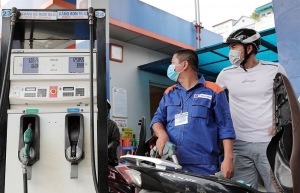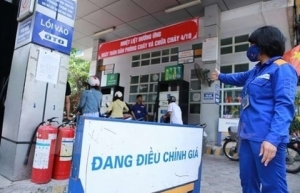Coping scenarios for oil price variations in logistics
The oil price fluctuations have seriously impacted businesses across different industries. How are logistics service providers faring in Vietnam?
 |
| Le Quang Trung, vice president of the Vietnam Logistics Business Association |
Oil and energy prices make significant impacts on logistics service providers. For road transport, railway, aviation, and maritime transport, logistics service costs make up 16.8 per cent of the total goods value. The threshold for logistics service providers may reach 60-65 per cent.
For transport activities in general, fuel costs make up 30-40 per cent of the price structure. Therefore, when fuel cost rises 10-15 per cent, freight charges will increase accordingly.
Continuous surges in oil prices raise operating costs and seriously affect business results in this industry, especially in the context that they have been striving to recover from the pandemic.
In contracts with partners, we have clauses related to freight charges. However, we cannot change freight costs immediately when oil prices fluctuate. A rise in fuel costs does not mean a respective ratio increase in freight charges amid stiffening competition in the market. Freight charges depend much on market supply and demands.
For shipping lines operating international routes, unfavourable locations for oil supply or those with higher oil prices can strongly increase operation costs, forcing them to make considerations into possible changes in their operation, thus decreasing their business results.
For those operating domestic routes, they face much more pressure when fuel cost increases because domestic oil price at home is often higher than that abroad.
How can logistics service providers deal with new changes to possibly mitigate losses?
While international freight charges have skyrocketed by five or six times as much, and amid interruptions in the global supply chain, we have taken two major actions. The first related to technical issues, and businesses had to readjust governance and norms. In some cases, we had to adjust the speed of ships in order to save fuel.
The second relates to commercial measures. Besides targeting to make a profit, logistics businesses have the role of supporting goods circulation and import-export activities. We used more flexible business plans and found alternative measures such as connecting with the railway industry and developing direct connection routes.
Moreover, amid digital transformation acceleration in industries, we have increased technology application to increase operational efficiency.
In general, when fuel cost surges, transport operators have to adjust their operation of ships towards saving costs, including reducing speed, considering routes that operate efficiently, and opening new ones, while increasing tech application. However, such a reduction may affect their whole operation process, as well as negotiations with partners about service contracts and long-term commitments.
What are logistics businesses’ expectations from the government’s supporting policies to help recover from the complexities over the past few years?
We highly appreciated the government’s timely policies to support businesses and stabilise material prices during recent strong fluctuations in global oil prices. These measures have helped our members.
We expect that the existing oil policies will be kept unchanged until the third quarter of 2023 to enable businesses to have more time to improve their operations and build risk preparations for their activities related to fuel price fluctuations.
Businesses are making efforts in energy transition and using new-generation eco-ships to meet the requirements of green energy and emission reduction. However, technology changes and the use of eco-ships require a huge initial investment. Therefore, businesses need encouraging policies to make investments for sustainable development in the long term.
We recommend that there should be increased connectivity by using digital platforms and developing logistics centres to promote multimodal transport. This will help circulation and transportation activities more efficiently, thus saving more energy.
 | Vietnamese oil facing significant hurdles The government is promoting energy self-reliance rapidly as global developments have significantly changed the world’s energy situation, pushing Europe into gas scarcity for this winter. |
 | Strategies considered to cope with oil shifts As there is no silver lining ahead just yet when it comes to stabilised oil prices, economists and associations agree that corporate taxes should be reduced and oil reserves built to help cope with the current dilemma, but both of these solutions would be costly. |
 | Economists petrol stabilisation fund to be scrapped Economists and industry experts have voiced concerns over the petrol stabilisation fund continuing as a tool to keep prices down, deeming it too ineffective to make a real difference. |
What the stars mean:
★ Poor ★ ★ Promising ★★★ Good ★★★★ Very good ★★★★★ Exceptional
Related Contents
Latest News
More News
- PM outlines new tasks for healthcare sector (February 25, 2026 | 16:00)
- Ho Chi Minh City launches plan for innovation and digital transformation (February 25, 2026 | 09:00)
- Vietnam sets ambitious dairy growth targets (February 24, 2026 | 18:00)
- Masan Consumer names new deputy CEO to drive foods and beverages growth (February 23, 2026 | 20:52)
- Myriad risks ahead, but ones Vietnam can confront (February 20, 2026 | 15:02)
- Vietnam making the leap into AI and semiconductors (February 20, 2026 | 09:37)
- Funding must be activated for semiconductor success (February 20, 2026 | 09:20)
- Resilience as new benchmark for smarter infrastructure (February 19, 2026 | 20:35)
- A golden time to shine within ASEAN (February 19, 2026 | 20:22)
- Vietnam’s pivotal year for advancing sustainability (February 19, 2026 | 08:44)

 Tag:
Tag:




















 Mobile Version
Mobile Version